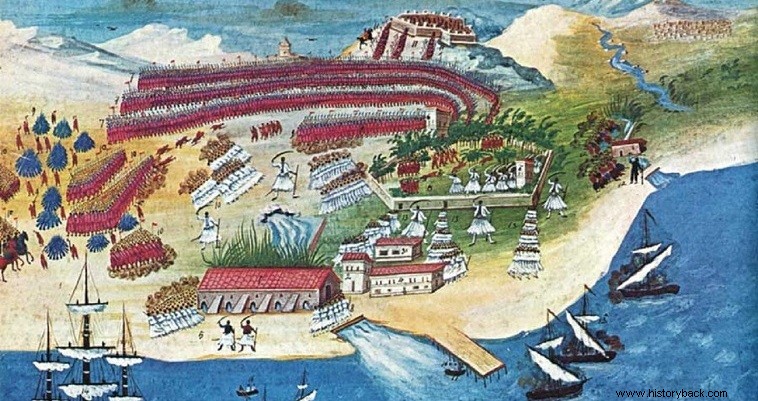
In 1825 the situation for the Greeks, due to the civil conflicts and the incompetence of the administrators, had immediately become tragic. Ibrahim had landed in the Peloponnese, had crushed the Greeks at Kremmidi in Messinia, had also defeated Papaflessa and had conquered many castles, even Tripolitsa.
Having defeated Kolokotronis in the battle of Trambala the Egyptian pasha moved towards Nafplio . The possible occupation of the city would have as a certain consequence the extinguishing of the revolution in the Peloponnese and possibly also in the rest of Greece.
Makrygiannis with his body had been ordered to move towards Tripolitsa. But on his way to Tripolitsa he learned that the city had already been taken. So Makrygiannis retreated and fortified himself at Mylos, southwest of Nafplio, to cover the city.
Mylos was a small village with about 30 houses next to ancient Lerna, built on the marshy ground of the area. In the village, on the beach, there were warehouses and behind them a mill. There was also a walled garden and a stone tower of the Turkish aga.
De Rini
The incident with the French admiral de Rini (Derigny for the Greeks) and the famous poem happened there. De Riney landed at Mylos and saw the Greek positions. “What do you do with this? These positions are impossible, what kind of war are you going to make with this Braimis?", he told Makrygiannis, according to his narration.
"I tell him, positions are impossible and we, but God is strong where he protects us and we will show our luck in these impossible positions. And if we are few in the crowd of Braimi, we are consoled in a way, that our luck always has the Greeks few.
"That beginning and end, in the past and until now, all the beasts fight to eat us and they can't. They eat us and there is only yeast left. And the few decide to die, and when they make that decision, they lose a few times and many they win. The position where we are here today is such and our fate will be seen by the weak and the strong. Trebien, he says, and the admiral left."
Makrygiannis, together with Konstantinos Mavromichalis, Dimitrios Ypsilantis and Hatzimihalis Dalianis had a total of 480 men. Ypsilantis lined up at the right end of the village, Makrygiannis in the center and Mavromichalis with Hatzimihalis on the south side of the village. It is worth noting that Makrygiannis, fearing the leakage of his men, asked the fishing vessels to open in deeper waters...
Surprise and hand-to-hand combat
On June 13, 1825, the Egyptian advance guard attacked by surprise. Makrygiannis reports that the Greek targets had abandoned their positions and were sleeping. He himself perceived the enemies and with 50 men attacked them, in turn, by surprise, causing them confusion.
After this the Egyptians halted awaiting the arrival of the main body and Ibrahim.
At 4.30 pm Ibrahim ordered the troops to attack. The Egyptians formed attack phalanxes, in front of which acrobolists were deployed. With this formation they attacked. In the south, thanks to the support of the ships' guns, the men of Mavromichalis and Hatzimichalis, repelled three Egyptian attacks.
In the center, however, the Egyptians managed to occupy part of the garden, forcing Makrygiannis' men to reach almost the coast. Makrygiannis then ordered his men to kill the Egyptian officers, as he understood that without them their men did not develop initiative. So it happened and immediately after that the Greeks, with swords in hand, counterattacked and regained the lost positions.
A new counterattack by Ibrahim repelled the Greeks, but again a new Greek counterattack forced them to retreat temporarily. A new Egyptian counterattack threw the Greeks back again. In this second attack, Makrygiannis was almost killed, as he was trying to pull one of his slain lads so that the enemies would not take his body.
De Riney, meanwhile, watched with enthusiasm the battle and the Greeks who, beyond all expectation, held out, and sent a present, with four of his officers, of drinks for the warriors. Meanwhile, the Greeks repelled the Egyptians with a new attack. The Psarians and the Cretan warriors led by Dimitrios Ypsilantis distinguished themselves in this attack.
After this attack was repulsed, Makrygiannis received reinforcements from Nafplio - 50 men under Macedonian commander Mitros Liakopoulos . A little later, a company of the Regular arrived - 60 men under Captain Karpos.
Makrygiannis reports that the regulars fired a volley into the air and that they did not actually fight. However, it seems that the counterattack of Karpos, whose company, in boats, landed at the rear of the Egyptians, decided the battle definitively, as mentioned by the captain of the Regular Army Christos Byzantios in his book "History of the Regular Army of Greece" .
Makrygiannis had been wounded, badly in the arm, and was apparently unable to see the final phase of the battle. However, the result was victorious and the victory belongs to Makrygiannis, who was the soul of the Greek defense and the first in the counterattacks.
The victory at Mylos saved Nafplio and the revolution. The losses were small, on both sides. The Egyptians had 50 dead and twice as many wounded. The Greeks had seven dead and 21 wounded.
Makrygiannis was bedridden for 38 days due to his injury and a doctor told him that he should be amputated. But when he was going to amputate him, Makrygiannis grabbed the yatagani and the doctor left badly...
